G1: PERSONAL PRONOUNS AND THE FORMS OF TO BE
Das bedeutet: Die Personalpronomen und die Formen von to be
SINGULAR
(long form)
I am
you are
he is
she is
it is
PLURAL
(long form)
we are
you are
they are
SINGULAR
(short form)
I’m
you’re
he’s
she’s
it’s
PLURAL
(short form)
we’re
you’re
they’re
Beispielsätze:
I am from London. I’m from Manchester.
You are nice. You’re cool.
He is my friend. He’s my dad.
She is at home. She’s in school.
It is a desk. It’s a chair.
We are in 3/4f. We’re in 3/4d.
You are funny monsters. You’re boys.
They are new. They’re girls.
G2: THE NEGATION OF TO BE
Das bedeutet: Die Verneinung von to be
SINGULAR
I’m not in Nuremberg.
You’re not from Germany. (oder: you aren’t)
He’s not my grandpa. (oder: he isn’t)
She’s not in love. (oder: she isn’t)
It’s not a computer. (oder: it isn’t)
PLURAL
We’re not dumb pupils.
(oder: we aren’t)
You’re not a teacher.
(oder: you aren’t)
They’re not in the city.
(oder: they aren’t)
G3: THE POSSESIVE DETERMINERS
Das bedeutet: Die Possesivbegleiter
SINGULAR
My name is Mr.Tailor.
Your friend is Robert.
His dog is beautiful.
Her bike is dirty.
Its box is big.
PLURAL
Our tablets are awesome.
Your time is nearly up.
Their school is in Nuremberg.
G4: THE PLURAL OF NOUNS
Das bedeutet: Die Mehrzahl von Nomen
SINGULAR
a book
a dog
a pencil case
PLURAL
two books
three dogs
four pencil cases
G5: THERE IS / THERE ARE
Das bedeutet: Dort ist… / Dort sind…
SINGULAR
There is a rabbit.
There’s a dog
PLURAL
There are cats.
There are many animals.
G6: THIS/THAT AND THESE/THOSE
Das bedeutet: Das dort und diese dort
SINGULAR
This is my English book and that’s my exercise-book.
PLURAL
These are chairs and those are desks.
G7: QUESTIONS AND SHORT ANSWERS WITH TO BE
Das bedeutet: Fragen und Kurzantworten mit to be
Wie im Deutschen ist bei einer englischen Frage das Prädikat und das Subjekt vertauscht:
SINGULAR
Am I a teacher?
Yes I am.
No, I’m not.
Are you crazy?
Yes, you are.
No, you aren’t.
Is he smarter than me?
Yes, he is.
No, he isn’t.
Is she a pupil?
Yes, she is.
No, she isn’t.
Is it smaller than me?
Yes, it is.
No, it isn’t.
PLURAL
Are we a team?
Yes, we are.
No, we aren’t.
Are you in school?
Yes, you are.
No, you aren’t.
Are they in Nuremberg?
Yes, they are.
No, they aren’t.
G8: QUESTIONS WITH WHERE, WHO, WHAT, HOW
Das bedeutet: Die Fragewörter wo, wer, was, wie
WHERE = WO
Where is my cat?
Where is the sun in the universe?
WHAT = WAS
What is a car?
What are you watching on TV?
WHO = WER
Who is the most beautiful football-player?
Who is my best friend?
HOW = WIE
How big is my dog?
How are you?
G9: THE IMPERATIVE
Das bedeutet: Der Imperativ (die Befehlsform)
Bring me your tablet, please.
Sit down and be quiet, please.
Look at my cat, please.
Do not be silly.
Don’t sing too loud, please.
Do this, please
